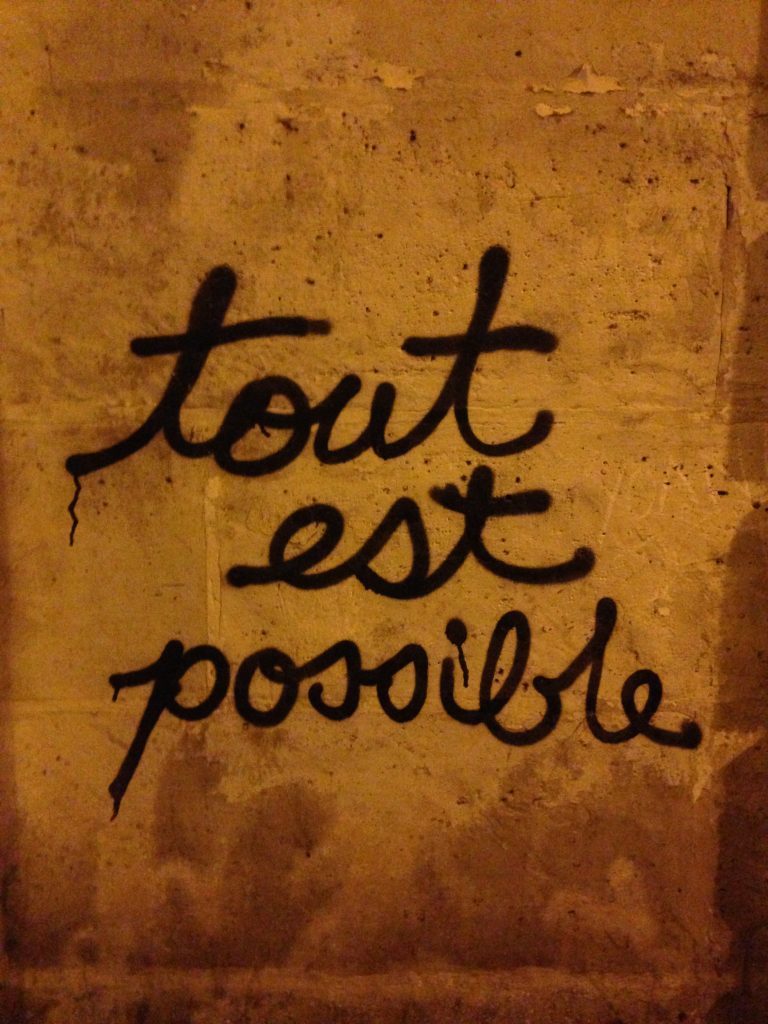Why is learning French so frightening for beginners? If only you knew it isn’t that hard!
When I started learning French, the most common response I receive upon telling someone that I’m learning French—from English and French speakers alike—was something along the lines of, “French is so hard! I can’t believe you can speak like this after only three months!”
This exclamation was typically followed by exasperated hand wringing over the difficulty of the pronunciation, the seemingly endless list of exceptions to every grammar rule, the conjugations, and so on.
French is considered by some to be among the world’s “hardest languages“.
After having officially eclipsed the three-month milestone in my French language studies, I’d like to dispel, once-and-for-all, the (surprisingly) pervasive notion that French is somehow impossibly difficult to learn.
Spoiler alert: it’s not.
Table of contents
- Your Vocabulary Knowledge in Your Native Tongue Will Help You a Lot
- French Pronunciation Isn’t Too Different From What You Already Know
- Learning French Conjugation Is a Question of Perspective
- Here’s How to Face French Tenses Like a Winner
- Is the Dreaded Subjunctive So Important to Learn?
- Just Go SPEAK FRENCH

Your Vocabulary Knowledge in Your Native Tongue Will Help You a Lot

Any discussion of why French is not difficult for English speakers ought to begin with the date September 28, 1066. That’s the date the Norman conquest of England began.
During the four hundred years that followed, a dialect of French known as Anglo-Norman became the language of the crown, the educated elite, the ruling administration and the justice.
Even today, the Queen’s assent, which must be given to legislation passed by parliament in order to become law, is still issued in French.
How cool is that!
Nerdy historical tangents aside, what does any of this have to do with learning French nowadays?
Linguists estimate that about a third of English words are derived from French. This means that as an English speaker, even before you crack open a phrasebook for the very first time, you have a ready-made vocabulary that you can start using from day one.
Do you have six hours to spare? Great—have a crack at this Wikipedia list of shared vocabulary.
Second spoiler alert: it’s long.
Language Hacker Tip: Cheat Your Way to French Vocabulary
Language hacker tip: From a practical standpoint, I’ve found that anytime I’m at a loss for the right French word, coating an English word in a heavy French accent is a surprisingly effective strategy.
I remember during my first week in French class, I was trying to say that a certain French word exists in English but has a different meaning.
I didn’t know the word for “meaning” in French, so I said the English word “connotation” with a thick French accent. I paused and studied my teacher coyly, waiting for her to correct me. She looked at me expectantly as if to say, “Well, duh! Connotation! Everyone knows connotation!”
You’ll notice that many other “_–_tion” words appear in French almost exactly as they do in English. That’s true especially in British English, which never replaced the “s” in words like réalisation with a “z” as we’ve done in American English.
The circumflex you find in many words usually signifies that an “s” used to be present but has since fallen out of use. Thus, words like hôpital and forêt translate to “hospital” and “forest” in English.
There are many more tricks like this, and though they can’t always be perfectly applied, these examples should give you a sense of just how much linguistic history the two languages have in common.
French Pronunciation Isn’t Too Different From What You Already Know
Okay, so perhaps you’re thinking that, yes, you realize that English and French have many words in common… But there’s no way you’re ever going to be able to master that perfect accent your fantasy French husband/girlfriend/whatever has.
Ah, but not so fast!
Along with many of the French words that migrated into English came vestiges of their former pronunciations. Consider words and expressions like montage, déjà vu, bourgeois, comprise, brochure, filet mignon, chauffeur, lingerie, and encore.
Without knowing it, you actually use many of the sounds found in French regularly.
Still, others can give you clues as to what you shouldn’t pronounce, including faux pas, buffet, coup, and laissez-faire.
Even the dreaded liaison rears its ugly head in the words vis-à-vis (pronounced “vee-zah-vee”) and bon appétit (pronounced “baw na-pey-tee”).
I’ll admit that the French “r” and nasal sounds will probably take some practice and getting used to. However, the best advice I received—from my Lonely Planet phrasebook, nonetheless—was just to go for the most stereotypical French accent I possibly could.
Try it. It actually works!
Learning French Conjugation Is a Question of Perspective

One of the most common complaints among French learners is the seemingly incomprehensibility of verb conjugations. Consider the forms of the verb manger (meaning “to eat”) below:
- First Person Singular: Je mange (“I eat”)
- Second Person Singular: Tu manges (“You eat”)
- Third Person Singular: Il/Elle/On mange (“He/She/One eats”)
- First Person Plural: Nous mangeons (“We eat”)
- Second Person Plural: Vous mangez (“You (pl.) eat”)
- Third Person Plural: Ils/Elles mangent (“They eat”)
Did you survive that with your sanity intact? Great! It may look like a lot to wrap your head around, but it’s actually not, especially in spoken French.
In fact, the difference between written and spoken French is so vast that the first person singular, second person singular, third person singular, and third person plural forms of the verb manger are pronounced exactly the same despite having written forms that appear to vary substantially.
Add to that the fact that the third person singular On form is usually used in place of the first person plural, and you don’t even have to think about changing the pronunciation for the majority of verb forms in the present indicative.
The Key to Stop Fearing French Conjugation Groups
The group of verbs that manger belongs to, the –er verbs, is one of three, the other two being –ir and –re verbs. The –er verbs are completely regular, the –ir verbs are mostly regular, and the –re verbs are mostly irregular.
Don’t let the third “irregular” group scare you, though. Not only does it comprise the smallest of the three groups, it’s also considered to be a “closed-class.” This means that all new verbs introduced into the French language are of the first two “regular” classes.
Thus, new words like googliser, textoter, and téléviser take the regular forms.
Even among the irregular verbs, you’ll be able to pick up on patterns that make their conjugations fairly predictable.
Also remember that, as was the case with the –er verbs, the verb forms of the irregular verbs are pronounced mostly the same (though there are some exceptions).
Here’s How to Face French Tenses Like a Winner
As for the other tenses, anyone who’s learned Spanish will be relieved to find out that there are fewer tenses in French than in Spanish.
Le Passé Composé
In modern French, for example, the most frequently used past-tense construction is the passé composé. This is a compound tense composed of the verb avoir (meaning “to have”) or être (meaning “to be”) followed by the past participle of the conjugated verb.
In the passé composé, the first person singular form of manger is J’ai mangé, which literally translates to “I have eaten,” but it is also used to say “I ate.”
Unlike English or Spanish, French uses the same tense to express both concepts. There is a passé simple, but it’s an antiquated literary tense that is seldom used in contemporary spoken French.
L’Imparfait
French also uses an imperfect tense: the imparfait.
L’imparfait has only one set of endings (unlike Spanish), contains only one exception (être, meaning “to be”), and is used in exactly the same way as the Spanish imperfect.
In order to form the imparfait, take the present indicative Nous form of a verb, slice off the conjugated ending, add the imparfait ending, and voilà! You’re in business.
Le Futur Proche
There’s the futur proche, which will be extremely familiar to speakers of English and Spanish. It simply combines the conjugated form of the verb aller, meaning “to go,” with an infinitive.
It’s equivalent to saying in English, “I am going to [BLANK].”
Le Futur Simple
There’s also a futur simple that, like the imparfait, uses only one set of endings that are added to the “future stem,” which is usually just the infinitive or, for the irregular verbs, the infinitive with the final “e” chopped off.
There are about two-dozen irregular future stems, but these irregular stems also double as the stems for the conditional.
Le Conditionnel
The conditional is formed by adding the imparfait endings you already know to the future stem.
This might all sound confusing, but the main point is that these verb forms and moods are constructed using things you already know. The more you learn, the more your knowledge builds on itself.
Is the Dreaded Subjunctive So Important to Learn?
Though the subjunctive mood that’s the scourge of Spanish students everywhere exists in French, it’s used in both fewer instances and in fewer tenses than it is in Spanish.
It almost exclusively follows que or qui, which is less often the case in Spanish. Take, for instance, the following phrases in English, Spanish, and French:
English: “If I were you, I would be happy.”
Español: Si yo fuera tú, sería feliz.
Français: Si j’étais toi, je serais heureux.
Take a look at the two verbs in bold for a moment.
While the Spanish version uses the imperfect subjunctive, the French phrase uses the imperfect indicative (standard past tense use of the word, like English) to express the exact same idea.
In French, the imperfect subjunctive is a stodgy literary tense that nobody even uses anymore!
Just Go SPEAK FRENCH
There are, of course, plenty of quirks and exceptions in the French language, as there are in any language, but the key, as always, is just to go out and SPEAK IT! Like Benny Lewis says, French is easy! Both speaking and understanding are within your grasp.
As a language nerd, I’m a big fan of Benny, whose “Speak from Day One” approach should be, I think, language-learning gospel. He’s written several posts about why learning Czech, Turkish, German, Mandarin Chinese, Hungarian, and other languages is not as hard as you think.
His point is that with the right attitude and approach, learning a new language—despite what detractors might claim—is never as difficult a task as it’s often made out to be.
Native speakers won’t be shy about correcting you, and the more you speak and make adjustments, the more natural it will become.
There are some great French online courses that will get you speaking quickly, and don’t worry if your pronunciation is a little off, or if you forget how to conjugate such and such verb, or if you forget which preposition to use.
Just remember: everyone starts off speaking any language they learn like a baby.
Original article by Zack Simon, updated by the Fluent in 3 Months team.
The post Learning French for Beginners: Proofs that Learning French Isn’t That Hard appeared first on Fluent in 3 Months.


0 Commentaires